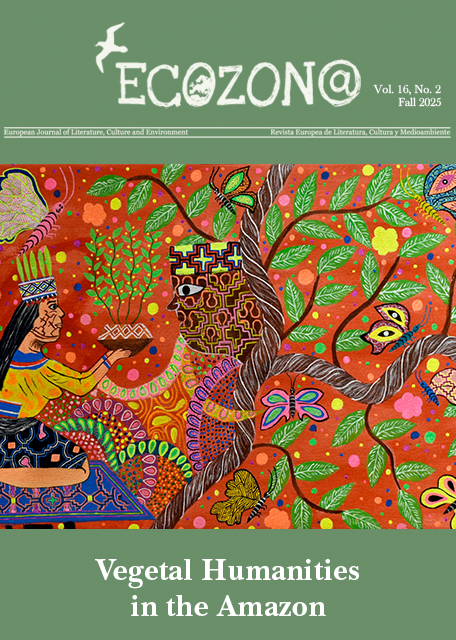Ecojustice Poetry in The BreakBeat Poets Anthologies
DOI:
https://doi.org/10.37536/ECOZONA.2022.13.1.4421Schlagworte:
Ecopoetics, Ecojustice, Hip hop poetry, African AmericanAbstract
Ecological modes of thinking and an awareness of environmental (in)justice are becoming increasingly pronounced in the ethics and aesthetics of hip hop. One area in which the culture’s growing interest in ecology as practice and metaphor is particularly visible is hip hop poetry’s turn to ecojustice, or an intersectional concern with social and environmental justice, liberation, diversity, and sustainability. This article examines selected works from the first two volumes of anthologies published by Haymarket Books as part of their BreakBeat Poets series, focusing on three ecojustice-oriented poems that address animal rights, (un)natural disasters, and gentrification. Their authors–all Black women– draw from African American history and culture to illuminate the intertwined ideological, political, and economic dimensions of some of the most pressing humanitarian and environmental crises of today. Samantha Thornhill’s “Ode to a Killer Whale” takes the form of a poetic monologue by the fictional character of Kunta Kinte, revealing similarities between human and animal subjugation and inscribing animal liberation in the Black revolutionary tradition. Candace G. Wiley’s “Parcel Map for the County Assessor” re-members and re-creates a culture of place that permeated the speaker’s countryside childhood to present the larger-than-human cost of rural gentrification. Finally, Mariahadessa Ekere Tallie’s “Global Warming Blues” juxtaposes the personal and the elemental dimensions of climate change in a blues remix that advocates for ecojustice for the disenfranchised.
Downloads
Downloads
Veröffentlicht
Ausgabe
Rubrik
Lizenz
Authors who publish with this journal agree to the following terms:
a) Authors retain copyright and grant the journal right of first publication with the work simultaneously licensed under a Creative Commons Attribution License that allows others to share the work with an acknowledgement of the work's authorship and initial publication in this journal (CC BY-NC for articles and CC BY-NC-ND for creative work, unless author requests otherwise.
b) Authors are able to enter into separate, additional contractual arrangements for the non-exclusive distribution of the journal's published version of the work (e.g., post it to an institutional repository or publish it in a book), with an acknowledgement of its initial publication in this journal.
c) Authors are permitted and encouraged to post their work online (e.g., in institutional repositories or on their website) prior to and during the submission process, as it can lead to productive exchanges, as well as earlier and greater citation of published work (See The Effect of Open Access).










